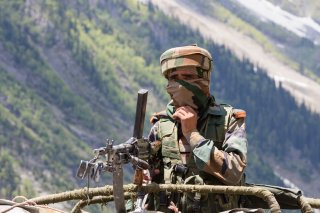The Evolution of Terror Financing in Kashmir
Over the past thirty years, an entire socio-economic system has built itself around terrorism in one of the world’s most contested regions. A new book explains how.
Terror Financing Portfolio: Diversity and Complexity
The author also analyzes at length the economics of the proxy war. A rough estimate based on field surveys and interviews suggested that Pakistan, on average, spends less than INR 250,000 to 300,000 million in producing one militant. In contrast, Indian security forces spend roughly INR 6 million to 7 million every day on counter-terror cordon and search operations in addition to spending vast amounts of money on narrative building and countering Pakistani narrative, maintaining a massive presence of armed forces, goodwill, and development projects, etc. The sheer difference between the figures mentioned above is sufficient to explain why Pakistan’s proxy war strategy is a robust way of bleeding India white.
Over time, the terror masterminds have devised new ways and investment fronts to sustain separatism and militancy. As the system evolved in complexity and scale, more investment for running separatist media, think tanks, organizing stone-pelting and protests, funding political parties and sustaining assets in police, administration, and judiciary, sustaining Islamist organizations like Jamaat-i-Islami, universities, schools, coaching centers, foreign trips of journalists and activists, information and narrative war. Another interesting feature of terror financing that emerged in Kashmir was the major involvement of mainstream institutions of politics, administration, banking, academics, and media in the terror financing dragnet. Mainstream institutions, in fact, became a crucial part of this illegal system.
The terror masterminds based in Pakistan and their state sponsors created an intricate world of terror financing, developing stakes for everyone in it, including the elites like separatist leaders, politicians, militant commanders, and ordinary middle-class individuals, who found various ways to use the terror funding dragnet to earn extra money. A whole illegal economy developed in parallel to the legal one.
So far, this subject has remained unexplored because of the fragile security situation in Jammu and Kashmir, preventing researchers from venturing into the conflict and interviewing key fighters and stakeholders. The absence of any systematic research in this field explains the paucity of data in the open domain and academic literature; hence, it had to be overcome with extensive fieldwork, which the author has accomplished to bring a story to light that has not been adequately told before.
Dr. Abhinav Pandya is a founder and CEO of Usanas Foundation, an India-based geopolitical and security affairs think-tank, and the author of Radicalization in India: An Exploration.
His new book, Terror Financing in Kashmir, will go on sale in December.
Image: Shutterstock.

